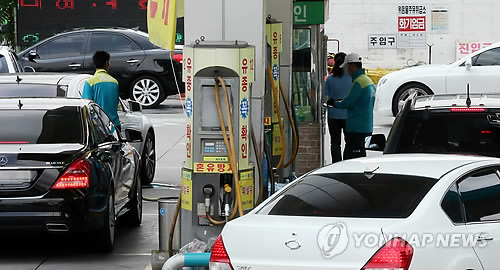Gasoline-powered vehicles recovered domestic market share here in the first half of this year, on the back of weaker demand for diesel cars, industry data showed Tuesday.
The number of new gasoline vehicles registered in the first half accounted for 50.2 percent, surpassing the 50 percent mark for the first time since 2013, when gasoline-powered vehicles posted 52.7 percent, according to data compiled by the Korea Automobile Manufacturers Association.

In contrast, the market share of diesel vehicles fell to 36.3 percent in the first half of 2017, the lowest in the past four years.
The market share of gasoline vehicles started to bounce back here as demand for diesel cars began falling after the Volkswagen’s emissions scandal in 2015.
Diesel vehicles once reached as high as 44.7 percent of vehicles here in 2015. That was a jump from 27 percent in 2012, according to data.
Diesel vehicles’ market share started to decrease after the emissions scandal, accounting for 39.7 percent in 2016, with the trend continuing this year as well.
The proportion of foreign diesel cars registered in Korea also fell. Of the total foreign vehicles registered in the first half of 2017, diesel cars accounted for 50.1 percent, an 8.6 percentage point decline from 58.7 percent last year. In 2015, 68.8 percent of imported cars were diesel-powered vehicles.
Sales of gasoline vehicles increased by some 7 percentage points to reach a 40.8 percent share in the foreign vehicles market in the same period, compared to an annual market share of 33.9 percent last year.
Meanwhile, new registrations of hybrid cars increased in the first half of this year to account for 4.4 percent, a twofold increase from 2013.
The proportion of electric vehicles also reached a record high of 0.6 percent, compared to the annual figure of 0.3 percent for 2016.
Sales of gasoline-powered, hybrid and electric cars increased by filling the gap created by the decline in diesel cars sales, KAMA explained. Consumer sentiment also weakened after the government’s attempts to tackle diesel cars, it added.
By Shim Woo-hyun (ws@heraldcorp.com)




![[Herald Interview] 'Amid aging population, Korea to invite more young professionals from overseas'](http://res.heraldm.com/phpwas/restmb_idxmake.php?idx=644&simg=/content/image/2024/04/24/20240424050844_0.jpg&u=20240424200058)












![[KH Explains] Korean shipbuilding stocks rally: Real growth or bubble?](http://res.heraldm.com/phpwas/restmb_idxmake.php?idx=652&simg=/content/image/2024/04/25/20240425050656_0.jpg&u=)

